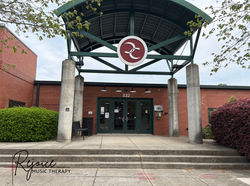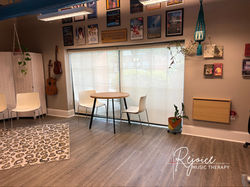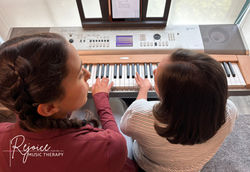
Who We Are & What We Do
Music Therapy is a healthcare profession in which a credentialed music therapist utilizes music interventions to accomplish a non-musical goal. Music therapy is for all ages, skill levels, & abilities & takes place in group or individual settings. Music & its elements (pitch, dynamics, structure, texture, melody, harmony, timbre, & tempo) are intentionally & thoughtfully manipulated to bring about specific & measurable responses related to goals. Goal areas may be cognitive, social, emotional, physical, communicative, spiritual, or related to end of end of life. No matter the goal area, the overall goal of music therapy is to regain, maintain, or improve some level of function.
The Rejoice Team
Rejoice Music Therapy employs talented and compassionate board-certified and board-eligible music therapists to serve residents in North Carolina. Our ever-growing client list includes skilled nursing communities, memory care units, assisted living communities, adult day centers, community centers, family care homes, private homes, as well as clients who come to our clinic for sessions.
Come see us!
Send us an email to schedule a time to come look around.
Frequently Asked Questions
1. What kind of music do you use in sessions? Since music therapy is personalized to client needs and tastes, music is thoughtfully selected in order to encourage the most response, engagement, and benefit.
2. What is the difference between music therapy and music lessons or music entertainment? The main differences are goals and providers. Music Therapy goals are always non-musical. Music lessons aim to teach a person to do things such as sing, play an instrument, or read music. The purpose of music entertainment is primarily to provide pleasure. Music Therapy USES music, but for goals that are social, emotional, cognitive, physical, spiritual, communicative, academic, or for wellness or end of life care. The overall goal for music therapy is always to maintain, regain, or improve some level of function. If a musical skill is learned or improved, this would be a secondary benefit to primary goals. Additionally, music lessons are provided by music teachers. Entertainment is provided by entertainers. Music Therapy is provided by board certified Music Therapists.
3. Do I need musical training or skill to participate in and benefit from music therapy? No musical training or skill is needed. Almost every person responds to music in some way, as music stimulates the entire brain. A trained music therapist is able to use music and its elements (pitch, timbre, harmony, melody, meter, rhythm, style, texture, structure, tempo, and more) to encourage change, response, and progress.
4. Is music therapy mainly for kids and for people who just need relaxation? Music therapy is appropriate and effective across ages, diagnoses, and settings.
5. What happens in a music therapy session? Depending on the goals and who the session is for, there may be singing improvised or familiar songs, playing or improvising on a wide variety of percussion instruments, movement to music, writing music, discussing music, listening to live music, performing music, or musical games. The session will be tailored to the needs and interests of the client.
6. How long and how often are music therapy sessions? Individual sessions are once a week for 30 minutes or 45 minutes. Group sessions are usually once a week for 30 to 40 minutes for small groups and 45 to 55 minutes for large groups. These details can be explained and planned when registering with Rejoice Music Therapy.
7. Who can provide music therapy? Someone who has completed at least a four year degree in music therapy from an accredited school can provide music therapy. Once coursework for a bachelor's degree in music therapy is completed, a six month clinical internship is required before sitting for the national board exam.





.jpg)

.png)













_edited_edited.jpg)